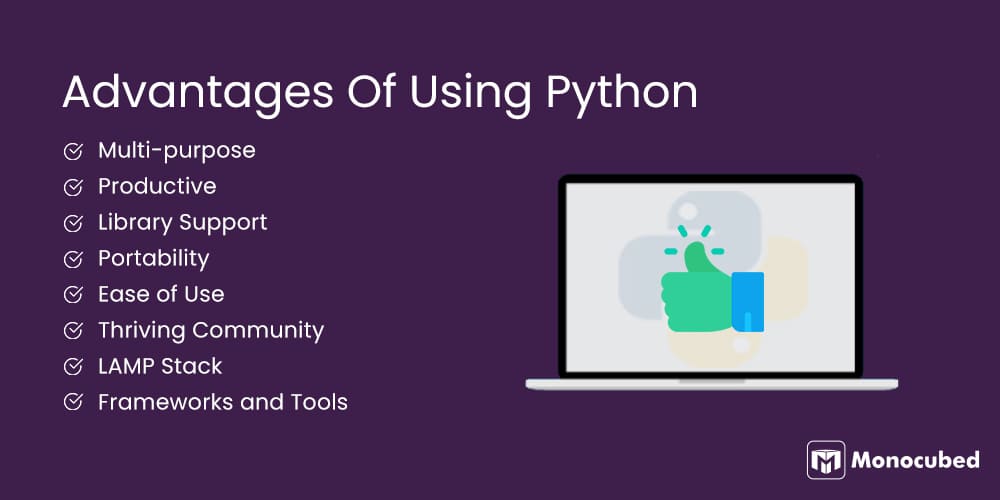Python is one of the most loved programming languages for web app development. It offers many advantages, with simplicity and flexibility being the main reason for Python’s rise in popularity.
- Is Python a frontend or backend language?
- Are Python apps better than others?
- Is Python good with new technologies like Machine Learning or Big Data?
Being a leading Python development company in USA, we often get such questions from our clients. We have written this article for to answer these common Python questions.
In this blog, we are going to discuss the advantages of Python programming language for your web development project. We will go through some of the Python disadvantages as well.
But first, let’s have a brief look at what Python is.
Table of Content
Python – At A Glance
Python is a highly intuitive object-oriented programming language. It is a general-purpose language that is used for a variety of objectives, such as software development, web scripting, and Machine learning apps.
Python was founded in 1991 by Guido Van Rossum. It is one of the most popular programming languages today, according to the Tiobe Index of June 2021. It is clear from the statistics that Python’s popularity is ever-rising.
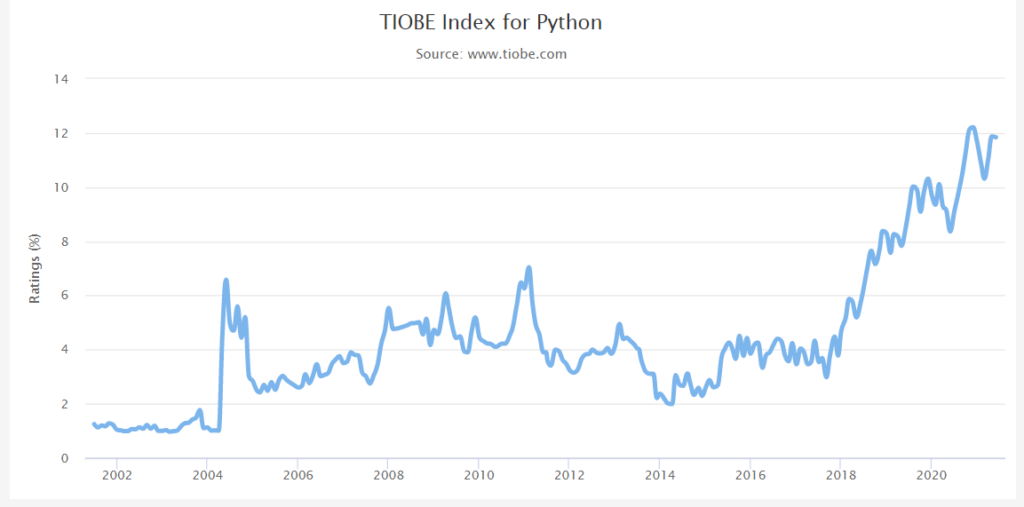
Python’s usage spans multiple fields such as data analytics, DevOps, programming web crawlers, web servers, web parsers, automated tests, computer graphics, game development, and desktop development.
Python is also the top choice in academic learning as it is written in the English language. It is easy to learn and provides clean readable syntax. You are also able to meet the requirements of data science applications.
Why Python? 8 Python Advantages
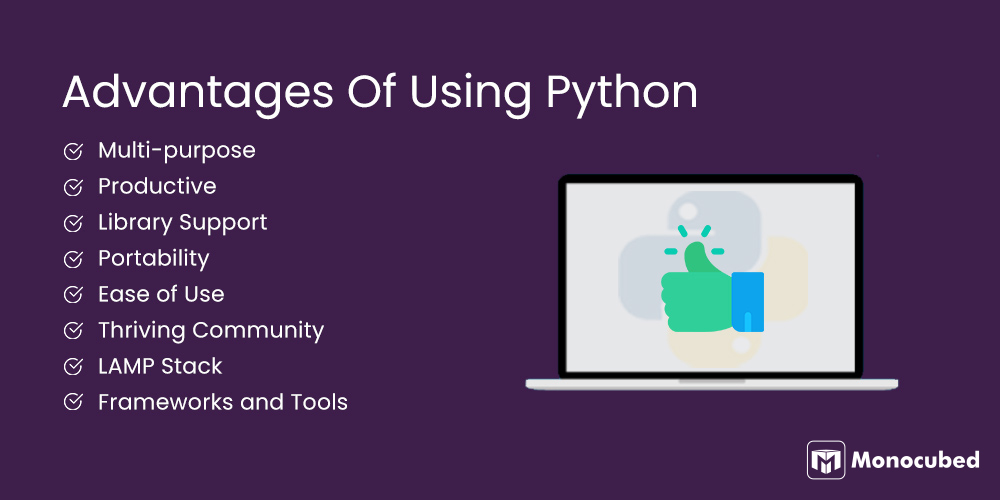
There are many advantages of using Python as a web scripting language. It is a preferred choice for a lot of businesses and there are many reasons for the same.
Flexibility, readability, scalability, portability and speed are some benefits of Python. It is also one of the only programming languages that support math-intensive applications.
So what are the advantages of Python? Why should you use Python for web app development?
-
It is Multi-purpose
Python is a general-purpose high-level programming language with a wide array of applications. From website development using frameworks, such as Django and Pyramid to game development and Desktop GUI development and web scripting, Python is a widely applicable language.
It is used on multiple platforms, for developing various middleware products, and spans many application domains.
Python is also an optimal choice for security operations. Information security, website security and cybersecurity are all functionalities that can be implemented with Python. You can read about the many live examples of Python web applications at Applications for Python. -
Increases Developer’s Productivity
Productivity is a huge attribute for web projects. Python’s ideology is following conventions and avoiding repetitive tasks that take up a lot of time. Due to this, Python is a highly productive language. Being dynamically typed, it is easier for a software developer to code and debug your application.
Reusing templates and modules is very time-efficient and the easy-to-use syntax optimizes the whole developing process. Not to forget the unit testing and debugging frameworks, and the process integration features are added pros of Python, making it an ideal choice when working under strict deadlines. -
Massive Library Support
Python’s biggest advantage is the number of third-party libraries it supports. A Python library is a piece of pre-written code that you can include in your project or a collection of modules. The Python Standard library, written in C, comes equipped with syntaxes, tokens, and core modules.
Python developers also have a wide repository of components and Python software in the form of the Python Package Index (PyPI). These external libraries can be used for writing documentation, automated testing, scripting web browsers, handling databases, graphics and CGI, email servers, and threading.In addition, there are also a number of libraries available for scientific and mathematical functions, such as NumPy, TensorFlow, Pandas, SciPy, and PyTorch.
-
Highly Portable Code
Python is designed to be highly portable. It is supported by all the operating systems, Windows, Linux, UNIX and macOS. Python code can run on different OS and environments without requiring any modifications. It also includes the Tcl GUI toolkit for implementing portable GUIs.
Python also has unbelievably advanced support for integration with other programming languages. GitHub’s page for CPython, the reference implementation of Python in C, has over 38.7K stars and more than 1500 contributors. Similarly, it can be used alongside Java, C, C++, JavaScript, or Ruby.
In fact, Python is used as a glue for many web applications. Programmers write the critical programming code in C/C++ or Java and use Python modules to connect together the different components.
-
Easy to Learn and Use
Code readability and simple user-friendly designs are important aspects of a programming language. Python employs a neat, clean and well-structured design for easy understanding and usage.
Flexibility, readability, and a powerful interpreter make it one of the easiest object-oriented languages to use. Automated memory management is one more advantage offered by Python. It also supports multiple programming paradigms such as functional, object-oriented, imperative, and declarative allowing easy implementations.
-
Thriving Community
The Python community is very inclusive and innovative. With an open-source license, Python users included beginners and experienced developers. The software developers work in harmony to provide solutions and hold intellectual discussions.
With the discovery of Python’s With its usage discovery in new technologies such as Machine Learning or Artificial Intelligence and Cyber Security, Python’s rise in popularity. Within just the last 5 years, the number of programmers using Python has almost doubled.
More than 1 million websites currently use Python for server-side programming. With implementations in so many fields, Python has cultivated a huge community made up of students, academics, programmers, and scientists.
-
Part of the LAMP Stack
LAMP is a very famous acronym for a set of web technologies that go into building websites and web applications. LAMP, coined by Michael Kunze, stands for Linux, the operating system; Apache, the HTTP Server; MySQL, the relational database management system and Python, the programming language.
Although the ‘P’ originally stood for web language PHP, Python has long since replaced it as the top choice for a server-side scripting language. The LAMP stack is a widely used web solution. Most companies and organizations prefer LAMP for their website development for various reasons:
- All the technologies involved in the stack are free and open-source
- They are flexible and customizable technologies that can suit every development need.
- Many variants such as WAMP, LEMP, LAPP, LEAP, and MAMP are available.
- Safe and secure stack that is trusted by a large community.
-
Many Frameworks and Tools Available
Python has a large array of development tools and frameworks for every type of use.
Famous full-stack web frameworks such as Django, TurboGears, and Web2Py include an HTTP application server, a database management system, a templating engine, and a request dispatcher for server-side development and an AJAX toolkit along with UI elements for client-side development.
Micro frameworks such as Flask and Pyramid, on the other hand, focus on a particular aspect.
In addition, Content Management Systems, web client frameworks, and web components are also available for Python app development.
Want to Develop an Advanced Web App?
Chatbots? Handwriting to text? Auto text completion? Integrate such advanced features into your web app with the help of our Python developers.
Disadvantages Of Python Language
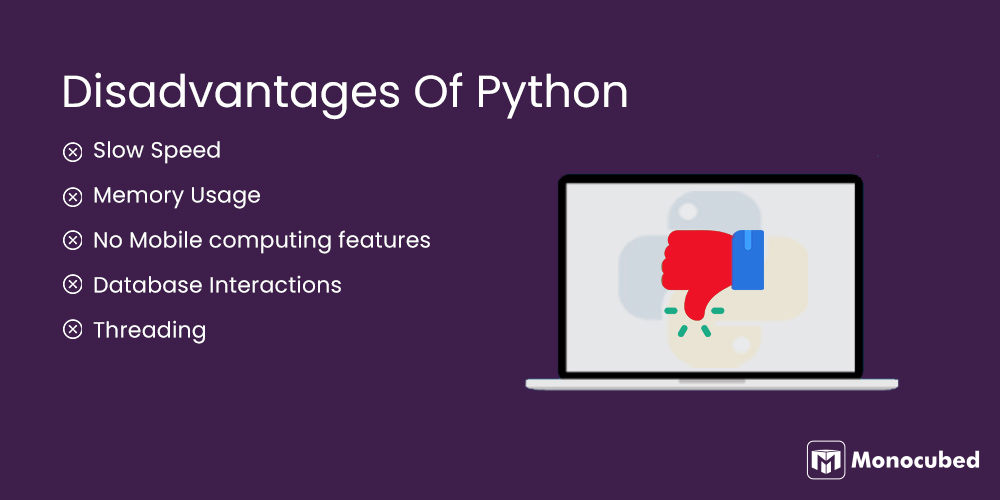
Although there are many Python advantages, there are also a few disadvantages that can hinder your development. It is important to have an understanding of the limitations and plan your project accordingly. Some of the disadvantages of using Python language are-
-
Slow Speed
Although Python is highly productive and has a considerably high speed of development, it has a disadvantage when it comes to runtime. As it uses an interpreter instead of a compiler, Python is slow as compared to other popular programming languages such as Java or C++.
Python is a dynamically typed language. Thus all the source code gets compiled at run time which slows down the speed, especially for large web apps. It is also an interpreted language, which means each line is executed one by one affecting the overall runtime speed.
-
High Memory Usage
Python programs use a lot of memory owing to its design philosophies. Having “everything you need is in-built already” ideology, means it is a surprisingly heavy and monolithic framework.
Heavy memory consumption is a trade-off of the many functionalities the language offers. When working with restricted memory space Python is not a suitable choice.
-
No Mobile computing features
Python doesn’t have enough functionalities to build a whole mobile application. It takes up a lot of unnecessary time for mobile app development. But there have been new GUI applications such as KIvy and BeeWare that can be used for native and cross-platform mobile apps. Still, other languages like Java or C++ would be much better for mobile development till there are some upgrades to the language.
-
Limited Database Interactions
As compared to popular technologies like JDBC and ODBC, Python’s database access layer is not up to the mark. However, it cannot be applied in enterprises that need smooth interaction of complex data. Data security is also a concern when working with Python.
-
Threading Issues
Python supports multi-threading but the implementation is not perfect. There is something called the GIL( ) due to which only one thread can access the interpreter at any time. Thus there will be only one thread executing python code at a given point in time.
In the case of multi-core processors, a CPU-bound function executing on multiple threads will have a considerable impact on the program’s efficiency since it won’t actually be using all the available cores at the same time.
These were the advantages and disadvantages of Python development. Now let’s look at how useful Python is, specifically in the field of web app development.
Python Usage In Web Development
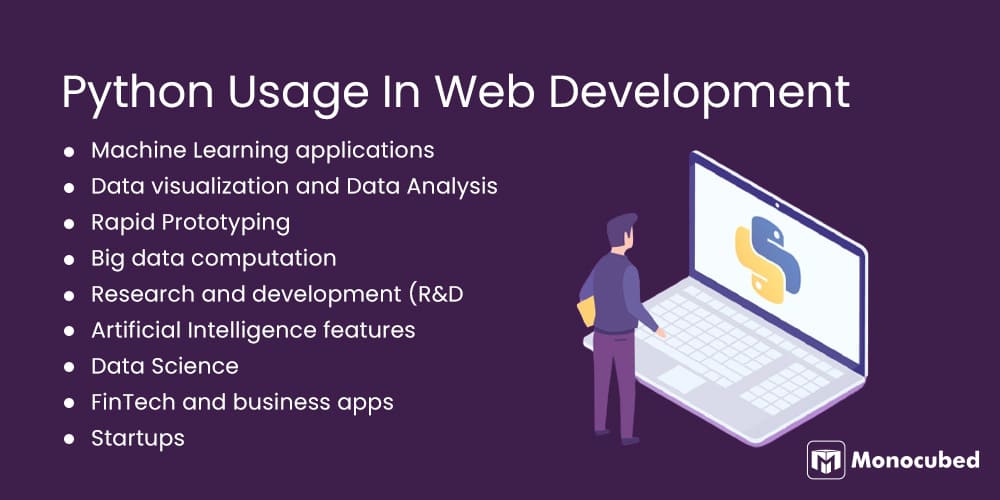
Python programming language is general-purpose and has various fields of application. Some popular apps built with Python are- Instagram, Spotify, and Pinterest.
So what is Python good for? Some implementations of this popular programming language are-
- Machine Learning applications
Machine Learning is one of the hottest trends in software development today. Implementing ML in your application, your Python program can intelligently consume unstructured data and make calculations and predictions. This means your application, without being explicitly coded, will perform tasks automatically for you.
Simply put, this enables you to develop applications that include features such as handwriting recognition, data mining, facial recognition and device tracking.
- Data Analysis and Visualization
Data extraction and analysis are the most important part of any business. This process is made more accessible with Python’s web scraping libraries, which help in the collection and interpretation of user data. Python provides libraries and tools for scraping through user’s likes, dislikes and preferences. There are also statistical and graphical tools that help you visualize and analyze the data to make profits.
- Rapid Prototyping
Prototype creation works very well with Python. Programmers build an application prototype to showcase its core functionalities to clients instead of coding the whole app. Refactoring the prototype code to build the application is fairly simple in Python.
- Big data computation
Web scraping extracting voluminous amounts of data from different web pages over the internet. The extracted data is generally used for the analysis and prediction of different real-world processes.
- Research and development
Python is also used for scientific research and computing. There are several Python libraries such as AstroPY, BioPython, Graph-tool, and PsychoPP that can be used for the implementation of computational biology, astrophysics, natural language processing, or data visualization.
- Artificial Intelligence Features
AI is a field involving massive research. Libraries, visual tools, simplicity, and consistency are some benefits of Python over other languages.
You can integrate your project with chatbots, biometrics security, personalized recommendations and even a voice agent like Siri or Alexa using Python libraries.
- Data Science
Python is the number one skill required for data scientists. Data processing and analysis is a broad field requiring handling large data sets. Owing to the integration merits of Python, you can work with already existing databases.
- FinTech and Business apps
The financial industry uses Python on almost every front. Along with FinTech companies, other enterprises also prefer Python. You can design business apps that integrate with existing systems like databases and other websites or non-web apps.
- Startup Development
The scalability of Python allows it to be the perfect choice for startups and small companies. High scalability, quick prototypes, the rapid development of Minimum Viable Products(MVP), and cost-efficiency are Python advantages that make it a preferred choice.
Frequently Asked Questions
What is Python used for?
Python is a general-purpose programming language having implementations in a vast array of fields. It is used as a scripting language for web browsers. It is also used for software development, web browser scripting, desktop applications, image processing, and more.
Why is Python so popular?
Python has been the most loved programming language by web developers. Its simplicity, ease of usage, flexibility and well-structured syntax, make the language a top choice for companies. The Python source code is readable and manageable and it is very easy to learn and use as opposed to some other programming languages such as Java or Ruby.
Is Python used for Artificial Intelligence?
Python programming language is an ideal choice for Artificial Intelligence and Machine Learning. It comes pre-installed with libraries such as Pandas, and SciPy that include pre-written components. It is flexible, follows object-oriented programming approach, has readable keywords and can be easily integrated with other languages.
Conclusion
There are many advantages of the Python programming language for up-and-coming businesses. Along with simplicity, code readability and flexibility, it also provides scalability, interoperability and backward compatibility.
Python advantages are numerous. It is after careful consideration of your project requirements, that you should govern if it is indeed the right fit. Most projects thrive with Python usage.
So, if you have a web project in mind, Monocubed can assist you in exploring and bringing it to realization. Get in touch with us anytime and our consultants will help you with Python development.
 By Jeel Patel
By Jeel Patel
